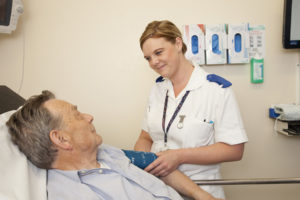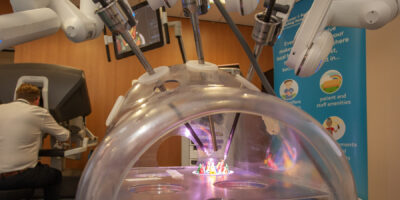 After much discussion, we have decided to investigate further, with a business case to be developed and a decision on whether to create such an entity to be made in the autumn of this year.
After much discussion, we have decided to investigate further, with a business case to be developed and a decision on whether to create such an entity to be made in the autumn of this year.
Any potential changes will only be made if the evidence clearly points to a better deal for the NHS, our patients and existing staff.
A WOS is an organisation set-up externally to a Foundation Trust but still within its ownership, which then allows for a limited number of services to be re-organised into this new, NHS-owned, company. It is important to make the distinction that a WOS is as the name suggests – wholly owned 100% by the Trust and not owned by a private, third party.
An option for hospitals for a number of years, other health organisations working in this way report greater workforce flexibility in dealing with specific skill-gaps, increased income generation which can be rolled into patient services, as well as further opportunities around procurement and tendering. There is also an opportunity to reduce the competitive edge enjoyed by private companies with potential VAT savings to be made.
In March, a discussion was held by our directors on the theory, opportunities and risks of setting up a WOS at DBTH. An open and honest dialogue, union representatives joined the session for a period of time to express their experienced views on the matter, while afterwards a specialist financial advisor detailed the various options for creating a WOS.
Reflecting on this session for the past two months, and with serious consideration of the anxieties felt by certain sections of Team DBTH, we have decided to, carefully, move forward. To do this, we will create a project group made up of senior representatives throughout the Trust, with an invitation for Staff Side (union representatives) to participate, which will investigate the opportunities and implications of creating such a company.
It is expected that once all of the issues have been considered, recommendations will be made and presented to the Board of Directors in autumn, with regard given to the views shared by our Council of Governors on the matter. A decision will then be made.
The leadership team at DBTH is made up of nurses, doctors and other professionals who have served the NHS for decades. Undertaking their roles with the utmost respect, responsibility and pride, we sincerely hope our staff, patients and local communities will trust in this collective expertise as we look to take steps forward for DBTH, ensuring the organisation is the best it can be.
Your questions answered:
What is a Wholly Owned Subsidiary (WOS)?
Wholly Owned Subsidiaries have been operated by NHS Foundation trusts for a number of years. Effectively this means creating a company, within 100% ownership of the former organisation. Selected services are then reorganised into this new entity.
In doing this, trusts are able to generate additional income, manage certain services more strategically, competitively recruit to certain professions as well as improve procurement and tendering processes.
A number of NHS trusts have adopted this method of working, reporting a number of benefits as well as describing the ability to create a level playing field with private companies, whilst keeping the ownership within the public sector.
In all, with the NHS facing substantial challenges, creating a WOS makes good business sense.
Is this just about tax savings?
No, although WOS can allow for potential VAT savings which the NHS cannot access, the Department of Health and Social Care mandates that trusts cannot use them solely for tax purposes. While financial savings can form part of the business case for such a proposal, an organisation must clearly identify the benefits of reorganisation before any secondary considerations are taken into account.
Will this mean all Trust staff are employed by the WOS?
No, just those, as of yet unidentified, selected services that are reorganised into the new company. It is envisaged that this would be limited to a small number of areas currently existing within the Trust.
What happens to existing staff reorganised into a WOS?
The terms and conditions of existing team members, re-organised into a WOS, are protected under the Transfer of Undertakings (Protection of Employment) Regulations (TUPE). As with any large-scale change, applicable staff would be consulted about the transfer to a WOS and have a right to submit a formal objection.
By re-organising into a WOS, it can allow a Trust to be much more flexible in the recruitment of staff, such as:
- Offering higher salaries than would be allowed under standard NHS terms to attract staff with specialist skills in areas of shortage
- Offering bonuses for personal and corporate performance
- Enabling of pension contributions to count as salary, something which often attracts younger members of staff. This also allows the NHS to compete with private sector companies which work within the same area and specialisms – a current challenge faced by many organisations.
Is this just privatisation?
No, while a WOS is a separate legal entity, they are as the name suggests – wholly and 100% owned by the NHS. Trust board members usually sit on the newly created company’s Board of Directors, while they often continue to use the NHS logo and staff employed by the subsidiary are treated as a directorate or department within the organisation.
When will a decision be made by DBTH and who will be reorganised into a WOS?
The Trust’s WOS project group will investigate all opportunities and implications of creating a WOS, identifying which services are suitable. While the details have to be worked through, any business case would only recommend the transferal of a limited number of services.
It is expected that, once all of the issues have been considered, recommendations will be made and presented to the Board of Directors in autumn, with regard to the views shared by our Council of Governors on the matter. A decision will then be taken on whether to create such an organisation.
Staff potentially within the scope of this project will be engaged in discussions throughout the process.



